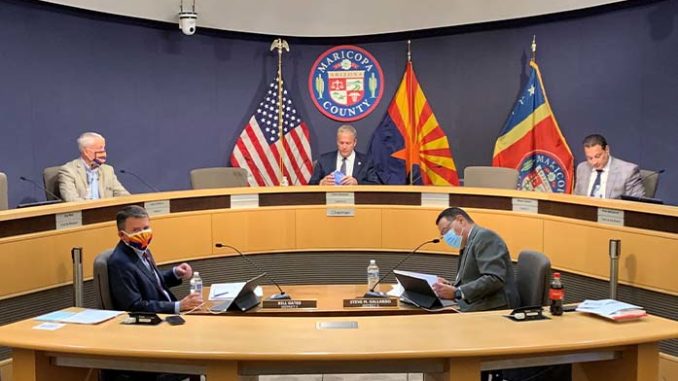By Terri Jo Neff |
A bill introduced by nearly one dozen legislators to require public bodies to provide the public with more information before discussing public matters in private under the guise of seeking “legal advice” is being strongly opposed by the very public officials who can currently conduct many discussions in secret.
Rep. Beverly Pingerelli (R-LD21) and 10 co-sponsors of HB2804 want to amend two statutes related to public meetings, executive sessions, and legal advice. Their bill passed the House last week and is now assigned to two Senate committees where its attempt to ensure more transparency in public meetings has garnered resistance from nearly every city and town, several elected school superintendents, and the County Supervisors Association of Arizona.
A public body is allowed by law to hold an executive session for the discussion, consideration, or consultation of only nine types of matters. One is to obtain “legal advice with the attorney or attorneys of the public body.”
Some officials claim they need flexibility at any time during a public meeting to move into a non-public executive session to obtain legal advice on any item on the agenda. That is why many public bodies utilize a generic disclaimer on every meeting agenda advising that the members may convene an executive session during the meeting with no further notice.
However, many citizens and public-transparency watchdogs have complained in recent years that public bodies are misusing the legal advice clause to privately discuss a variety of issues which could -and should- be discussed in public.
And that is where HB2804 comes in. The first thing it does is limit the situations in which legal advice can be used as reason for an executive session to the other eight subject matters permitted to be discussed in an executive session.
The bill would also require meeting agendas that include specific notice of any executive session under the legal advice clause to note which of the eight subject matters apply to the agenda item.
Such changes are long overdue, according to Diane Douglas, who served as Arizona’s Superintendent of Public Instruction from 2015 to 2018.
“The legal advice clause of the Executive Sessions statute -or the ‘get out of jail free’ clause as I call it- undermines the intent of Open Meeting Law,” Douglas told Arizona Daily Independent. “It should only be used very sparingly and only when a public discussion will compromise a negotiation, settlement, or an employee’s legally protected privacy.”
But Douglas says various public boards, commissions, committees, districts, as well as cities, towns, and counties currently end up discussing matters of public interest behind closed doors by “dragging an attorney in” even if the matters would otherwise be required to be discussed in public.
“Often times legal advice or discussion, that will not otherwise compromise a decision of the board, is of equal interest to the public being served,” Douglas said.
Douglas also notes there is already a simple solution for situations where an issue comes up during a meeting that requires legal advice, but an executive session has not been properly notice.
“Table the discussion and bring it back when proper executive session notice has been made,” she said.
The other eight types of subjects a public body is allowed to hold an executive session for include discussion, consideration, or consultation on matters of employment, assignment, or appointment; records exempt by law from public inspection; litigation and settlement discussions; contracts subject to negotiations; negotiations with employee organizations; international, interstate, city, town, tribal council or Indian reservation negotiations; school safety matters; and negotiations on the purchase, sale or lease of real property.
HB2804 would also require that any public body meetings related to the “goals and objectives” by which an officer, appointee, or employee of the public body will be evaluated “must be conducted in a public meeting.” However, any actual discussion or consideration about the person’s employment, assignment, or appointment would be done in private unless the person requests a public discussion.








